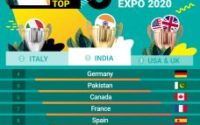GCC Consumer Confidence Out Performs That Of G8 Nations
Consumers in the GCC are among the world’s most optimistic when considering a post-Covid future according to the Inaugural Ding Global Prepaid Index (GPI). This bi-annual global study commissioned by Ding, the world’s largest mobile top-up service, examines the views of 7,000 respondents across KSA, UAE, Qatar, US, the UK, France, Brazil, Indonesia, and the Philippines.
Consumer attitudes towards the pandemic
Despite the difficulties imposed by the pandemic, consumers in the Gulf are among the most positive when it comes to their current and future situation. The overall consumer confidence rate stood at 63, far higher than the Global Consumer Confidence Index at 52.1.
Diving deeper into the data, KSA consumer confidence is at 68, UAE at 62 and Qatar, which only recently restored diplomatic ties with the rest of the GCC, is at 58. This positivity is also felt towards the economy with 71% in the GCC stating that they have an optimistic economic outlook and 66% feeling optimistic about their future work prospects.
There is a direct correlation between consumer confidence and perceived government handling of the Covid crisis (and the death rate) and again, GCC countries scored highly. Saudi Arabia had the highest approval rating for its government with 82% stating that the government is doing all it can to deal with the crisis. In the UAE this stands at 79% while in Qatar it is at 72%. This is in stark contrast to the West where just 34% in the US agree the government is doing all it can to handle the crisis, and 47% in both France and UK.
Vaccine hesitancy in the region is also low in comparison to the rest of the world. The majority of those surveyed in the GCC (62%) plan to get the vaccine once it is available. This was highest in the UAE (68%), followed by KSA (66%) while Qatar seems to be slightly more skeptical with 53%. This is still substantially higher when compared to France, were just 33% of the respondents plan to get vaccinated.
Commenting on the findings, Mark Roden, Founder and Chief Executive of Ding said: “The GCC’s swift response to the Covid-19 pandemic has been in contrast to many other countries around the world, and may be reflected in the consumer confidence of the region – globally, the pandemic has devastated people and businesses, but it is interesting that consumers in the GCC are feeling more confidence and optimism about their future than many others around the world.”
Choice or necessity?
The report also shows that consumers in the GCC are among the world’s most avid users of prepaid mobile phone contracts – and that there is significant appetite for other prepaid products. Prepaid mobile is favoured by a whopping 81% in Qatar, 76% in KSA and 70% of those surveyed in the UAE. Overall in the GCC, prepaid mobile is the preferred option for 76% of the respondents – but why?
Interestingly, those surveyed claim that it acts as a tool for controlling expenditure (28%) as well as suiting their needs better (31%). This popularity is especially striking when compared to other markets like the US where just 32% of respondents said they choose prepaid mobile.
Roden noted: “The Global Prepaid Index has revealed the importance of prepaid products for GCC consumers and our research shows that prepaid products are preferred across the economic divide – which goes in some way against the long held assumption that many were choosing prepaid options out of necessity rather than choice.”
Furthermore he added: “In fact, 83% of people surveyed globally claimed to engage in the prepaid economy by choice rather than out of necessity, enabling them to control their expenses while at the same time allowing those without a bank account access to communications and financial services.”
Appetite for prepaid products is not limited to mobile phones – KSA has the highest prepaid market size, with 95% of those surveyed having engaged in at least one facet of the prepaid market, including mobile bills, financial products, other bill payments like utilities, or gift cards/vouchers. In Qatar this stands at 91% while in the UAE it is at 90%, highlighting the overall opportunity of the prepaid market. The majority of these users (76% in the GCC) are engaging in prepaid mobile bills with 51% paying other bills prepaid.
The lockdowns and travel restrictions have left many unable to see their loved ones, making the need to communicate virtually more important than ever before. Even on its own platform, Ding has seen close to a 50% annual uptick in prepaid transactions during 2020, with customers prioritising keeping in contact by either topping up their own phones or sending airtime to others.







